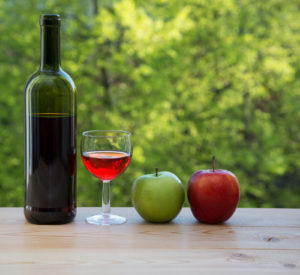
All About Quercetin
A new age has dawned on the world of food. More and more, will you find chefs on TV and in magazines explaining what foods will give you the most nutrition, and it’s fantastic! Influential chefs are taking their knowledge of food and sharing it with the world to help us eat better and live healthier lifestyles. Quercetin has a lot to do with that, but we’ll get to that in a minute.
Ushered in with this new era of focusing on what goes into our bodies is a word too commonly used: superfoods. I say “too commonly used” because on almost every healthy eating website, you’ll find this word used to describe almost every ingredient, causing this term to lose its meaning and power.
I mean, technically pizza is a superfood because it’s a food that makes me feel super.
Of course, this isn’t what superfood means, and please don’t go around telling people pizza is a superfood (it’s not). So what exactly makes a superfood a superfood? The answer to that is quite simple: Quercetin.
What Is Quercetin?
Quercetin puts the super in superfoods. This powerful flavonoid is part of what gives fruit and vegetables their vibrant colors. If you’ve read our articles enough, you’ll know that where there are colors, there are antioxidants.
Quercetin is a type of antioxidant that fights free radicals in the body. When free radicals begin forming in the body, they become hard to stop. Free radicals form in a “chain reaction” type of way and cause a lot of the problems we associate with aging.
When the bond between electrons weakens within a molecule, they split and become unstable. Looking to stabilize itself, the free radical will “steal” an electron from other molecules. When there are an uneven amount of electrons, it becomes a cycle of never ending free radical formation.
When too many free radicals form, cell damage and failure follow.
Luckily, antioxidants like quercetin can help fight against the formation of these free radicals by making sure all molecules are strong and stable. In addition, supporting healthy cells can prevent numerous diseases and ailments.
Histamine Properties
Because quercetin protects cells, it also helps to control histamine in the body. Histamine is a compound that is released as a natural reaction to bodily injuries and allergies. In controlling the amount of histamine being released, this antioxidant can be a natural anti-inflammatory and antihistamine.
As a result, test tube studies suggest that quercetin can help prevent and alleviate those annoying allergy symptoms like runny noses, lip swelling, watery eyes and hives. However, scientists need to conduct more human testing before this remedy gets our seal of approval as an antihistamine for allergic reactions.
What we do know is that quercetin can help prevent heart disease, hypertension, high cholesterol and cancer. Scientists have long held the belief that flavonoids like this one are a crucial part of cancer prevention. Quercetin has been shown to inhibit the growth of cancerous cells in breasts, prostates, lungs and ovaries.
Quercetin for Healthy Eyes
In addition to the health benefits listed above, quercetin is also a great way to enhance your vision and prevent cataracts from forming. This isn’t an antioxidant you want to skip…unless you want cataracts, but we have a feeling no one wants that.
Tests done in Japan on humans suggest that quercetin works especially hard to protect the retina of the eye. The retina is the part of the eye that allows us to see in wonderfully natural Technicolor. By keeping the retina protected and healthy, this antioxidant helps to promote clear and sharp vision.
In animals, quercetin seems to promote clarity of the lens, which is great news for those suffering from cataracts. Cataracts are the result of a protein buildup on the lens of the eye and causes blurred and sometimes loss of central vision.
Quercetin also has a certain effect on an enzyme called aldose reductase. This enzyme is often found in diabetic eyes, especially in the lens, cornea and retina. When aldose reductase builds up in the eye, it creates cloudy vision.
Quercetin curbs the buildup of aldose reductase in the lens, keeping it clear and unclouded. That’s why it’s especially important that diabetics keep this flavonoid in their diets.
Where Can I Find Quercetin?
Quercetin is found mostly in plants, plant-based foods, and beverages. Introduce quercetin into your diet by either eating quercetin-rich foods or by ingesting a supplement!
Quercetin supplements are easy to find, but they can be a little pricey. Supplements for this antioxidant can range anywhere from $11 to $70! Often, supplements are sold as capsules and are taken once to twice a day, depending on your needs. For example, people with chronic pain may take it twice a day. Check with your doctor to figure out the proper dosage for you.
If that’s too much of a hassle, check out our version of the quercetin supplement. Our Ocu-Plus vitamin supplements come packed with this flavonoid along with 16 other eye-healthy vitamins and nutrients. Plus, there’s no need to measure out your dosage: we’ve done the work for you!
Quercetin-Rich Foods
You can find quercetin naturally in a variety of foods and drinks, so you should definitely load up on this antioxidant that way as well. We all have to eat anyway, so we might as well get the most nutrition out of our favorite foods!
Luckily, quercetin is found in so many delicious and easily accessible foods. You can enjoy the majority of these foods raw as a healthy midday snack! They’re also common foods that can be found at any grocery store.
Here are our top picks:
 Apples
Apples- Berries (blueberries, blackberries, cherries, etc.)
- Capers (tip: stir them into your favorite pasta dish)
- Onions
- Plums
- Kale
- Asparagus
- Broccoli
- Red wine
Even though it’s often overlooked, quercetin is essential for keeping your eyes healthy. Diabetics would especially benefit from quercetin, as it helps prevent and alleviate diabetic-related eye conditions.
Of course, that doesn’t mean the rest of us can’t benefit from the health properties of quercetin. The more nutrients we can get, the better. So load up on apples, cherries, and your Ocu-Plus supplement, and enjoy!
Our Rebuild Your Vision Ocu-Plus Formula Contains All 17 Vitamins, Minerals, and Herbal Supplements to Improve Your Eye Health!












Amazon for about $10.00.
Can Quercetin, at possibly therapeutic doses, dissolve cataracts once they are formed without surgery? Would it need to be combined with some other element/s?
where do you buy quercetin and wht is the price
Hi Doris,
Great question. You can find Quercetin in many sources including our Ocu-Plus Formula. You can read more about the Ocu-Plus Formula on our eye vitamins page: https://www.rebuildyourvision.com/eye-vitamins/
Dear Dr Sorenson
I was wondering whether any of your products might assist in addressing diabetic retinopathy?
Any advice or recommendations would be appreciated.
Does Quercetin or the Ocu-plus formula help to correct astigmatism?